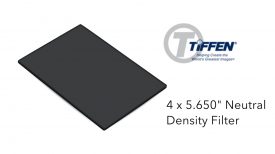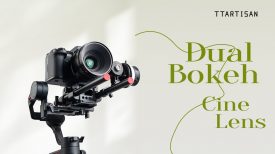
The BLAZAR NERO 1.5x Anamorphic Adapter is from the same company that makes the Great Joy anamorphic lenses. In fact, Great Joy previously made a 1.35x anamorphic adapter, so this new BLAZAR NERO 1.5x Anamorphic Adapter is essentially a new addition to their line-up.

The BLAZAR NERO 1.5x Anamorphic Adapter is a 1.5x squeeze front single focus adapter that has a rear filter thread of 52mm. It was designed to be used on 28-85mm lenses when shooting S35, and 40-85mm lenses when shooting full frame.
I’ll come out and say it, I am not the biggest fan of anamorphic adapters, but I know that some of our readers will be interested in this product, so I will review this adapter with an open mind and no preconceptions.
Key features
- Squeeze Factor: 1.5X
- Weight: 0.88lb / 399g
- Close Focus: 0.6m / 2 ft
- Focus Rotation: 180°
- Rear Thread: 52mm
- Front Filter Thread: 62mm
- Focus: Front Single Focus
- Rear Prime(S35): 28mm-100mm (S35)
- Rear Prime(FF): 40mm-100mm (FF-16:9) 45mm-100mm(FF-3:2)
- Prime Lens Focus: Infinity
Squeeze
The Great Joy 1.35x anamorphic adapter gave you a 1.35x squeeze when used on a spherical lens, a 1.8x squeeze when used in conjunction with a 1.33x anamorphic lens, and a 2x squeeze when used in combination with a 1.5x anamorphic lens.
With the new BLAZAR NERO 1.5x Anamorphic Adapter, you get a 1.5x squeeze when using it on a spherical lens and a 2x squeeze when using it in combination with a 1.33x anamorphic lens.
For me, the main reason for buying this adapter would be to use it in conjunction with a 1.33x anamorphic lens so you can achieve a 2x squeeze.

Size & Weight

The BLAZAR NERO 1.5x Anamorphic Adapter tips the scales at 400g / 0.88 lb. It is around 5.5 cm in length. While 400g may sound heavy for an adapter, as a comparison, the Moment 1.33x Anamorphic Lens Adapter tips the scales at 880g / 1.9 lb
Build Quality

The anamorphic adapter is nicely made and constructed.
The focus rotation is smooth and easy to use and it has a rotation of 180 degrees.

There is nothing I came across that concerned me when it comes to build quality.
It only has a 52mm rear filter thread

The biggest caveat with this adapter and many other anamorphic adapters is that the rear filter thread is only 52mm. This is a massive limiting factor and one that you clearly need to consider. Sure you could use it with a step-up ring if you had lenses with a smaller than 52mm front filter diameter, but again, that is a limited amount of lenses.
The Moment 1.33x anamorphic adapter has a 67mm rear filter thread. The Alvascope 1.5x anamorphic adapter has a 52mm rear filter thread just like the Balazer, and the Schneider Kreuznach ISCO4all Full Frame Anamorphic lens adapters utilize a 77mm rear filter thread.
52mm really limits what lenses you can use this adapter with. I will talk a little more about this further down in the review.
How do you use it?

You need to set the focus to infinity on your lens, and then use the focus adjustment on the anamorphic adapter.

You also need to align the adapter so that it is straight on your lens. You do this by pushing down on a little button and then turning the adapter.
I always find adapters problematic, because lining them up is always tricky and never straightforward.
The biggest issue is that this is really an adapter that is designed for use with smaller-sized digital cinema cameras and mirrorless hybrids, and from my experience if you don’t attach the adapter to a lens support and use it with rails it is relatively easy for the alignment to change while you are using the lens. This is another reason why I am personally not the biggest fan of adapters.

The adapter has a close-focus ability of 60cm / 1.96′.
Lens Choice

The biggest issue with anamorphic adapters is when it comes to what lenses you can use them with. You would think that this adapter would primarily be for people who own either the Great Joy FF 60mm T2.9 1.33X Full Frame Anamorphic Lens or the Sirui 1.33x anamorphic lenses, however, Great Joy actually told me that the adapter doesn’t actually work well with their 1.33x anamorphic lens.

Because it doesn’t work well with other anamorphic lenses, you basically have to use the adapter with older or current lenses that natively have a 52mm or smaller front filter diameter. In my personal opinion, that’s arguably a pretty niche application. Above you can see that I have the anamorphic adapter mounted on an old 50mm F/2 Nikkor lens.

At least in my opinion, you should be very careful using anamorphic adapters with old lenses, because you can end up with some very soft imagery depending on the lens.

Above you can see the lenses that Blazer recommends for use with the adapter.
Performance

This is a very hard one to quantify because it 100% depends on what lens you are using it with. Depending on the lens you are using, the optical quality can vary dramatically depending on the lens you are using. That makes it very difficult to quantify or demonstrate the optical quality of any adapter because it is directly being affected by the lens it is attached to.
In saying that, I will show you some technical tests that I did do with the adapter. I used a Nikon Z9 and shot in 8K.
The adapter is very soft if you set your lens below f/2.8. You arguably need to use it at f/4 and above to get decent sharpness, but again, this will depend on what lens you are using it with.
On wider lenses, you will get some pretty serious barrel distortion and distortion in the edges of frame.
There is also quite a lot of CA, but again, this also depends on the lens you are using it with.
The softness, CA, barrel distortion, etc. might be categorized by some people as being ‘character’, but I would use another word for it! The other problem with anamorphic adapters is the look and optical consistency you are going to get at different focal lengths will change. For some people that may be an issue, for others, it won’t.
Above you can see a quick flair test I did with the adapter and a Nikkor 50mm F/2 lens. I need to stress that this is just an example. The lens you are using with the adapter will ultimately determine what the flair looks like.
Above you can see some example footage taken with the lens and you can make your own conclusions based on what you have seen.
Price & availability

The BLAZAR NERO 1.5x Anamorphic Adapter retails for $999 USD, although you can currently purchase it for $899 USD up until the 25th of May. I personally feel like this is a little on the high side, however, it is a similar price to the and it does make it more affordable than the Alvascope or Schneider options.
How does this price compare to other options on the market? Below you can see:
| PRICE | |
| BLAZAR NERO 1.5x Anamorphic Adapter | $999 USD* |
| Moment 1.33x adapter | $1,099 USD |
| Alvascope 1.5x anamorphic adapter | €2,250 |
| Schneider Kreuznach ISCO4all set | £6,000 |
*On special for $899 USD up until the 25th of May.
Other Anamorphic Adapters

There are actually quite a few anamorphic adapters on the market that could be considered competition to the Blazer 1.5 x.

There is the Alvascope 1.5x anamorphic adapter. This is recommended for use with full frame lenses with a focal range of 50mm to 90mm. It is a single-focus anamorphic adapter with a close focus ability of 80cm and a focus ring rotation of 190 degrees. The front filter thread is 82mm and the adapter weighs in at 700g.

Schneider Kreuznach who owns ISCO Optics has the ISCO4all set. This set consists of full-frame spherical 43mm, 58mm, and 85mm T2.4 lenses and a 1.5x anamorphic adapter.
ISCO Optics started making anamorphic attachments for widescreen projection in 1953. Iscorama a trade-marked brand of ISCO Optics was a series of anamorphic lenses that were first manufactured in the late 1960s. These lenses were popular due to their high optical qualities and unique focusing characteristics. ISCO Optics continued to make lenses up until the early 2000s.

The ISCORAMA 54 CU-1.5x adapter is essentially a modern-day version of the original ISCORAMA 54.

It produces a 1.5x squeeze factor and it uses the patented ISCO single focus system. The ISCO anamorphic focusing mechanism was unique in that you just set the lens you were using to infinity and then focus was adjusted using the anamorphic adapter. With a lot of other anamorphic adapters, you needed to set the focus on both the lens and the adapter.
The minimum focusing distance of the adapter is 1.4m / 4.59′. The rear thread is 77mm, but there is an included 77mm to 72mm adapter. The front filter thread is 95mm.

The 43mm, 58mm, and 85mm T2.4 spherical lenses all have 11 aperture blades and they cover a 46.5mm image circle. They are only available in PL mount. What is interesting is that Schneider Kreuznach isn’t actually making these lenses, they are being made by the Chinese lens company Dulens. These lenses look to be rehoused versions of the Dulens APO Miniprimes.
Before you get too excited Schneider Kreuznach will be only making the kit initially available from specially selected rental houses from January 2022. However, they do have plans to actually start selling the set, but I don’t think that has happened yet.
Another competitor to the BLAZAR NERO 1.5x Anamorphic Adapter would be the now very old SLR Magic Anamorphot 1.33x adapter that was first shown at NAB 2017.

The SLR Magic Anamorphot 1.33x adapter was designed for use with 16:9 sensor cameras. The Anamorphot 1.33x – 40 (Compact) adapter allows users to achieve a 2.35:1 scope aspect ratio, when using traditional cameras that have a 16:9 sensor.
The SLR Magic 1.33x anamorphic adapter uses a unique 1.33x squeeze factor so that the entire 16:9 sensor is able to achieve the desired 2.35:1 aspect ratio. The Anamorphot 1.33x– 40 (Compact) adapter does this by compressing a 33% wider field of view to fit the width of the 16:9 sensor/negative without compressing image height.
The SLR Magic adapter creates unique “artifacts” such as horizontal lens flare, commonly referred to as anamorphic streaks, and may create slightly elongated bokeh when chromatic diopters are used. Characteristics that shape this anamorphic “look” come from the “front-mounted” anamorphic adapter design.
The SLR Magic Anamorphot 1.33x – 40 (Compact) adapter is small, lightweight, and features a single focus anamorphic adapter designed to work with most camera kit lenses beyond 40mm (35mm equivalent). The adapter has a 62mm thread so you won’t be able to use it on larger lenses. It even works with certain kit lenses when using autofocus, which is probably a first for adapters like these.
The SLR Magic SLR Magic Anamorphot 1.33x – 40 (Compact) adapter is still available today for $329 USD.
SLR Magic also has the Anamorphot-65 1.33x Anamorphic Adaptor that was announced way back in 2018. This anamorphic adaptor is optimized for the Fujinon MK zoom range of lenses but is also compatible with other lenses.

Key features
- 1.33x Anamorphic Squeeze
- For up to 65mm Front Diameter Lenses
- Mounts to Lenses with 82mm Front Thread
- 114mm Front Diameter
- Internal Focus Design
- 4′ Close Focus Distance
- Accepts 112mm Filters

SLR Magic make a number of anamorphic prime lenses but no zoom anamorphic lenses so they aimed to create an adaptor for the Fujinon MK zoom lenses. The adaptor works throughout the range of the MK 50-135 but only from 30mm on the MK 18-55. While it is optimized for the Fujinon MK lenses, the adaptor can work with other lenses as long as the front glass element is no larger than 65mm like SLR Magic’s MicroPrimes.
Unlike a cropped “anamorphic” image obtained with a spherical lens, this adapter enables you to utilize the total area of your camera’s sensor.
The adaptor has a close focus of four feet and can use 112mm filters for diopters. The adaptor itself has a focus ring and should be set to the same focal distance as the lens.
The SLR Magic Anamorphot-65 Adaptor retailed for USD $1,499 when it was first announced, but you can now get it for $649.00 USD.

There is also the Moment 1.33x Anamorphic Lens Adapter.
The Moment 1.33x Anamorphic Lens Adapter attaches to the 67mm front filter thread of lenses to convert 16:9 video into a 2.35:1 aspect ratio. Once screwed onto the lens, the front adjustment ring allows for focusing on subjects at a minimum distance of 2.3 feet. For the best results, the anamorphic adapter requires a lens of a normal or longer focal length, which differs depending on the sensor format.
To mount this anamorphic adapter to lenses, three rear thread adapters in 72mm, 77mm, and 82mm are included for lenses with those filter threads. The adapter itself features an 82mm front thread for using neutral density and other filters. Front and rear lens caps are also included, along with a weatherproof carrying case.
Focal Length Compatibility
Full Frame
Prime: 50-135mm
Zoom: 55-135mm
Super 35
Prime: 35-135mm
Zoom: 40-135mm
Micro Four Thirds
Prime: 24-135mm
Zoom: 30-135mm
The Moment 1.33x Anamorphic Lens Adapter reatils for $1,099.99 USD.
Conclusion
At least in my personal opinion, anamorphic adapters are a pretty niche product, especially in 2023 when there are so many affordably priced anamorphic lenses now available.
Anamorphic adapters are fiddly to use and the biggest caveat with the Blazer Nero as I mentioned previously in the review, is that you can only combine them with certain lenses. Having a 52mm rear filter adapter is a very limiting factor.
Yes, the adapter has ‘character’ but that means many different things to many different people.
Look, anamorphic adapters are not going to be for everyone and there will be people out there who will love the Blazer Nero as it is well-made and works as advertised.

















